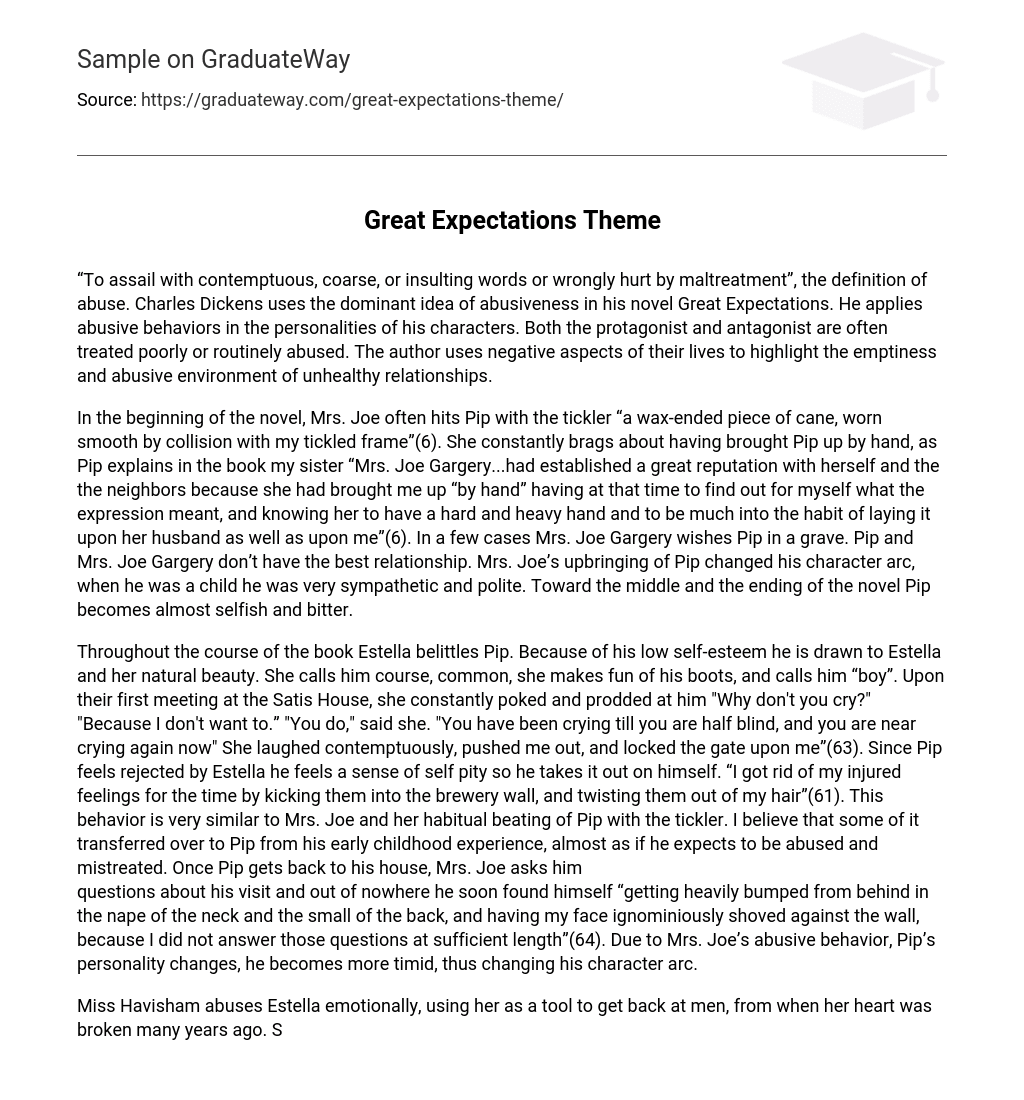“To assault with contemptuous, coarse, or insulting words or wrongly hurt by maltreatment” is the definition of abuse. In his novel Great Expectations, Charles Dickens explores the concept of abuse. He portrays abusive behaviors in the personalities of his characters, both the protagonist and antagonist experiencing mistreatment. The author employs the negative aspects of their lives to emphasize the emptiness and abusive nature of unhealthy relationships.
In the beginning of the novel, Mrs. Joe regularly hits Pip with a wax-ended piece of cane, which she affectionately calls the “tickler”. Pip describes it as being “worn smooth by collision with my tickled frame” (6). She likes to boast about the fact that she raised Pip herself, proudly claiming that she brought him up “by hand”. Pip recalls that he had to figure out the true meaning of this expression on his own. He also notes that his sister, Mrs. Joe Gargery, had a reputation for having a heavy hand, both towards him and her husband. There are instances in which Mrs. Joe Gargery even expresses her wish for Pip to be in the grave. Overall, their relationship is far from ideal. Pip’s character undergoes a significant transformation due to Mrs. Joe’s upbringing. As a child, he was empathetic and well-mannered. However, as the novel progresses, he becomes increasingly self-centered and bitter.
Throughout the book, Estella constantly belittles Pip because of his low self-esteem. However, Pip is attracted to Estella’s natural beauty. She mocks him by calling him names, making fun of his boots, and referring to him as “boy”. During their first encounter at Satis House, Estella continues to taunt and prod him, even accusing him of crying. Feeling rejected by Estella, Pip develops a sense of self-pity and directs his anger towards himself. Similar to Mrs. Joe’s habit of physically abusing Pip with the tickler, Pip resorts to kicking the wall and pulling at his hair to alleviate his hurt feelings. Perhaps this behavior is influenced by Pip’s early childhood experiences, making him anticipate mistreatment and abuse. Once Pip returns home, Mrs. Joe further reinforces this pattern of abuse by aggressively questioning him about his visit and physically assaulting him when he doesn’t provide satisfactory answers. As a result of Mrs. Joe’s abusive behavior, Pip becomes more timid, leading to a significant change in his character.
Miss Havisham emotionally abuses Estella, molding her into a vessel for revenge against men who have hurt her in the past. She ingrains in Estella a disdain for love, constantly urging Pip to love her despite the inevitable heartache it will bring him. Manipulating them like puppets, Miss Havisham exerts control over Pip and Estella behind the scenes. Estella, with her passive nature, easily succumbs to Miss Havisham’s influence and effectively becomes an object of attraction for men. This emotional abuse endured in her childhood alters Estella’s character, gradually transforming her into a colder and harsher individual as the story unfolds. Despite this transformation, Miss Havisham continues to caution Pip against falling in love with Estella, as she believes she is incapable of reciprocating his affection.
In Charles Dickens’s Great Expectations, the theme of “What’s important in life?” is presented through the abusive personalities that exist in the lives of the main characters. Whether it is physical or verbal, abuse is detrimental and can significantly alter the lives of individuals. As Samuel Griswold Goodrich states, “Abuse is the weapon of the vulgar.” Dickens emphasizes the detrimental aspects of life, juxtaposing it with an idealized life that includes supportive and caring friends. The way individuals are treated, whether positively or negatively, can have a profound impact on the trajectory of their lives.





